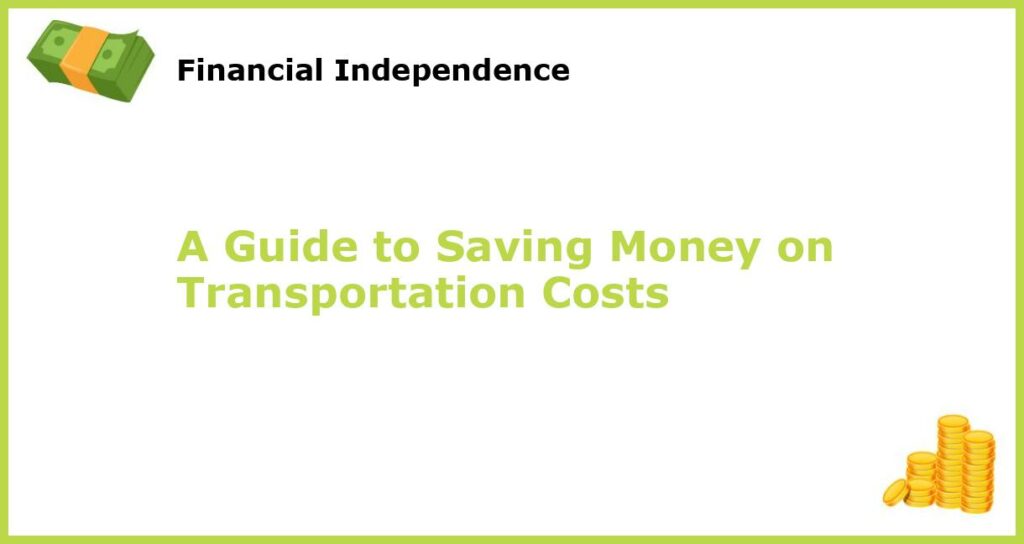Are you tired of the never-ending cycle of paying for transportation? The good news is that you don’t have to break the bank just to get around. Here are some tips on how to save money on transportation costs.
1. Ditch Your Car
Owning a car can be an expensive endeavor, and the costs can quickly add up. Between car payments, insurance, and maintenance, it can feel like you’re constantly shelling out money. If you live in a city that has reliable public transportation, consider selling your car and relying on buses, trains, or subways to get around. Doing this not only saves you money, but you’re also doing your part to help the environment.
If you’re hesitant to give up your car completely, there are still other ways to save some cash. Look at car-sharing services in your area, which can be a more cost-effective option than owning your own vehicle.
2. Carpool
Sharing a ride with others can help you save a significant amount on gas and tolls. Consider carpooling with coworkers or friends who have similar commutes. Plus, having some company on your daily commute makes the ride more enjoyable.
If you’re looking to find people to carpool with, check with your coworkers, post on social media or community boards to connect with others who have similar schedules and commutes. It might also be worth checking out ride-matching services or apps that can help you find people who need to go in the same direction as you do.
3. Bike or Walk
Depending on where you live, biking, or walking to work can be an option to consider. Not only is it free, but it’s also a great way to get some exercise and fresh air before starting your day.
If you’re not sure whether biking or walking is an option for you, start by figuring out how far you live from your workplace. If it’s within a reasonable distance, you can try walking or biking part of the way and using public transportation or a ride-sharing service for the rest. Be sure to invest in a good bike lock and wear a helmet for safety reasons.
4. Use Ride-Sharing Apps
If public transportation, biking, or walking aren’t the best fit for you, consider using ride-sharing apps like Uber or Lyft instead of driving your own car. These apps can be more cost-effective than traditional taxis while providing more flexibility than public transportation.
Additionally, some cities have local ride-sharing services that can be an even more affordable alternative. It’s worth checking if there are any options that could work for you and your budget.
5. Take Advantage of Tax Benefits
If you do own a car, be sure to take advantage of any tax benefits that come with it. For example, if you use your car for work-related travel, you may be able to deduct some of your expenses on your taxes.
It’s also worth investigating if there are other potential tax benefits that could apply to your situation. Look into your state or local tax laws, as well as any federal tax credits that you may be eligible for.
6. Plan Your Routes
If driving is unavoidable, planning your routes ahead of time can help you save money on gas. Using GPS apps like Waze can help you find the quickest and most fuel-efficient route to your destination.
By taking a moment to check out the best route, you can also potentially save yourself from sitting in traffic for hours, which in turn saves you money on gas and frustration.
7. Shop Around for Insurance
Car insurance can be a significant expense for car owners, so it’s worth shopping around for the best rate. Review your coverage and deductibles regularly to make sure you’re not overpaying for things you don’t need. You might be surprised at how much you can save by switching providers.
When you’re evaluating your options, don’t just look at the price tag. Consider what type of coverage you need and what deductibles work for you. Be sure to do plenty of research and be clear about what you’re paying for.
8. Take Care of Your Car
Owning car requires regular maintenance, and having a well-maintained car is more fuel-efficient and less likely to break down. Be sure to stay on top of your car’s regular maintenance, such as oil changes and tire rotations.
By making these repairs, you’re potentially saving yourself a significant amount in the long run. Taking care of your vehicle will reduce the risk of encountering bigger problems down the road while also reducing the amount of gas you need to use for each trip.
9. Avoid Rush Hour
Driving during rush hour can be stressful and time-consuming, not to mention expensive if you’re stuck in traffic burning gas. Whenever possible, try to avoid rush hour by leaving earlier or later than everyone else.
If your employer allows for it, ask if you can work flexible hours or shift your starting time, so you’re not caught in bumper-to-bumper traffic every day. Getting some extra work done in the early hours or even later in the day might sound daunting, but the payoff in flexibility and time saved can be worth it.
10. Negotiate with Your Employer
Negotiating a transportation benefit as part of your compensation package is a great way to save money on transportation. Some employers may offer options like a company car or reimbursement for public transportation expenses, while others might be open to a more flexible work schedule that allows you to avoid rush hour.
Having a chat with your boss or HR representative about your transportation needs can never hurt. Highlight how making easy changes can make a big difference in your productivity or work-life balance, and watch as the conversation turns in your favor.







